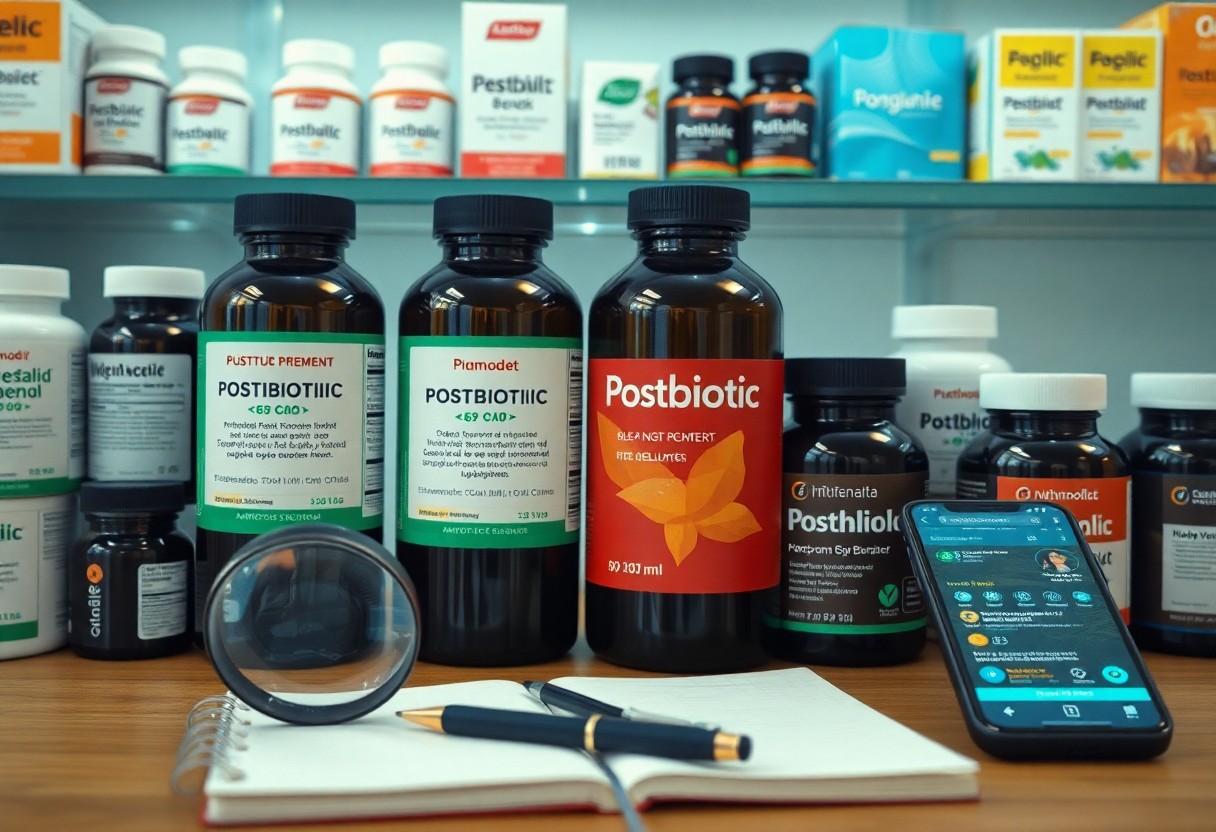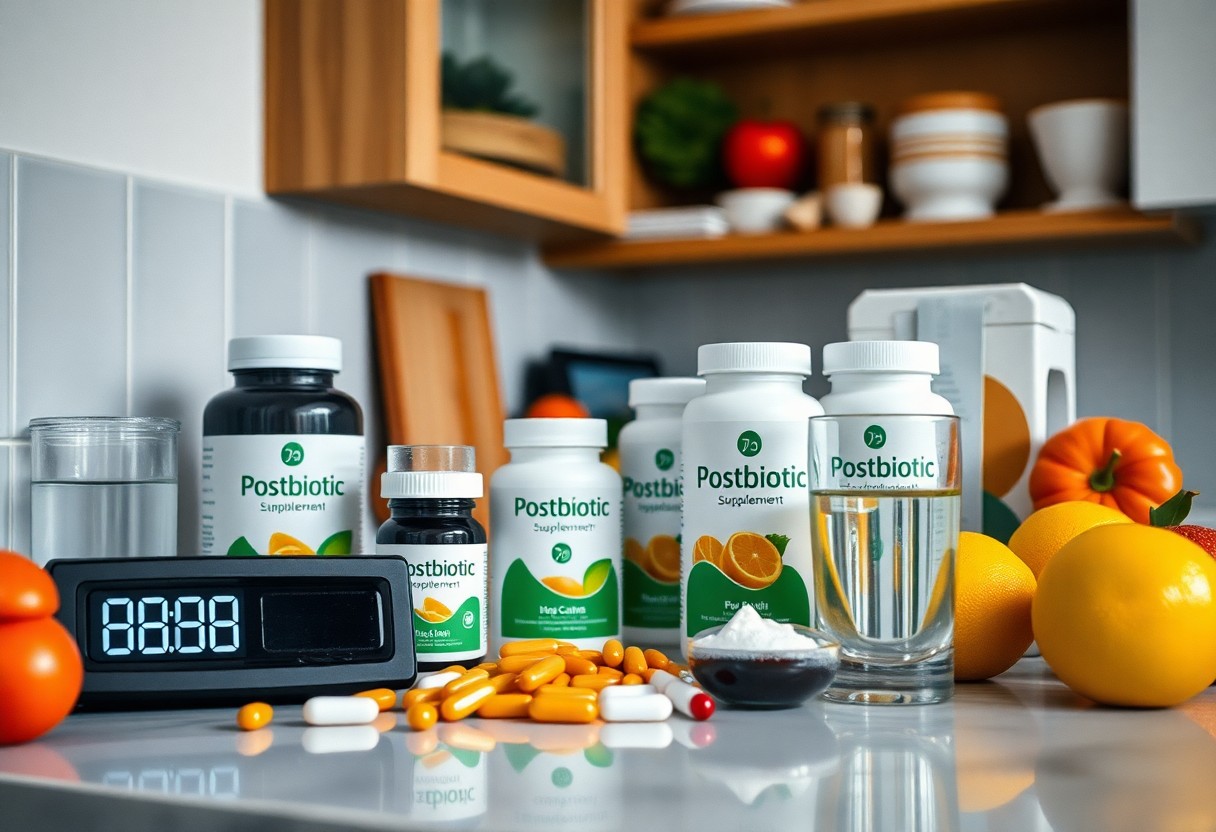There’s a growing interest in postbiotic supplements and their potential benefits for your gut health. As you navigate the world of probiotics and prebiotics, understanding when and how to incorporate postbiotics into your routine can be vital for maximizing your wellness journey. This informative guide will help you identify the right timing, dosages, and specific benefits of postbiotics, empowering you to make informed choices that support your overall health.
Key Takeaways:
- Postbiotic supplements are beneficial for gut health, as they contain metabolites produced by probiotics that support a balanced microbiome.
- They may help with digestive issues, enhance immune function, and improve overall well-being by fostering a healthier gut environment.
- Postbiotic supplements can be taken at any time of the day, but consistency is key for optimal results.
- It is advisable to consult with a healthcare professional before starting any supplementation to ensure it aligns with individual health needs.
- Look for high-quality postbiotic products that specify the strains and concentrations used to ensure efficacy and safety.
The Science Behind Postbiotics: Why They Matter
Postbiotics are the metabolic byproducts produced by probiotics during fermentation, playing a significant role in supporting your health. These components, including short-chain fatty acids (SCFAs), enzymes, and bioactive compounds, directly influence the gut environment and overall well-being. Research indicates that postbiotics can modulate immune responses, promote gut barrier integrity, and even alleviate symptoms of gastrointestinal disorders. Understanding their bioactivity unveils how they can contribute to enhanced health outcomes, particularly in gut health.
The Role of Postbiotics in Gut Health
Postbiotics significantly improve gut health by reinforcing the gut barrier, reducing inflammation, and balancing the gut microbiome. They foster an environment conducive to beneficial bacteria while suppressing the growth of harmful pathogens, ultimately supporting overall digestive harmony. Incorporating postbiotics into your wellness routine can lead to improved digestion, regular bowel movements, and a healthier gut flora.
Mechanisms of Action: How Postbiotics Impact the Body
Postbiotics exert their effects through various mechanisms that enhance their impact on the body. They can inhibit harmful bacteria by competing for nutrients and binding sites, leading to a healthier microbiome. Additionally, the production of SCFAs from postbiotics provides energy to colon cells, promotes the synthesis of mucus, and regulates appetite and metabolism. These actions help mitigate inflammation and enhance the immune system’s functionality.
Moreover, studies emphasize the impact of SCFAs on gene expression and cell signaling pathways associated with inflammation and immunity. For instance, butyrate, one of the most researched SCFAs, has been shown to inhibit histone deacetylases, promoting the expression of genes that have anti-inflammatory effects. Other postbiotic compounds also interact with immune cells, fostering a balanced immune response that diminishes overactive reactions. This multi-faceted approach underscores how postbiotics can be a vital ally in maintaining and promoting overall health through their intricate interactions within your body.

Timing is Everything: When to Consider Postbiotic Supplements
Postbiotic supplements can be a beneficial addition to your routine during specific life events or changes. For example, after a course of antibiotics, when your gut microbiome may be disrupted, or during periods of high-stress, when digestive health often suffers. Additionally, if you’re experiencing digestive irregularities such as bloating, gas, or discomfort, it’s wise to explore these supplements as a supportive measure for your gut health. Timing your intake after meals can also optimize absorption and effectiveness.
Signs Your Gut May Need Support
Pay attention to your body’s signals, as they often indicate when your gut needs support. Experiencing persistent bloating, irregular bowel movements, or increased food intolerances can be signposts for an unbalanced gut microbiome. If you’re frequently fatigued or dealing with skin issues, these too may correlate with gut health. Reflect on your dietary habits and lifestyle; if processed or sugary foods are prevalent, this might be your cue to look into postbiotics.
The Importance of Dosage and Duration
Finding the right dosage and duration for postbiotic supplementation plays a significant role in achieving optimal gut health benefits. Many products will provide recommended dosage guidelines; however, individual needs can vary based on your health status and dietary habits. While some might notice improvements within a few days, a longer period of supplementation—typically around four to six weeks—may be necessary for substantial benefits. Consulting with a healthcare provider can help you tailor your approach to postbiotic use.
While every individual’s gut flora is unique, most postbiotic supplements recommend a daily intake that can range from 2 to 10 billion CFUs, depending on the formulation. Consider starting at a lower dosage to assess how your body responds before gradually increasing. Duration matters too; many experts suggest a consistent regimen of at least 30 days to allow your gut time to adapt and rebuild. Tracking changes in your digestive health and overall well-being during this time can further guide your approach and help pinpoint the right balance for you.

Choosing the Right Postbiotic: A Buyer’s Guide
With a myriad of postbiotic supplements available, discerning the right one for your needs can be overwhelming. Your first step involves identifying your specific health goals—whether it’s improving gut health, enhancing immune function, or combating inflammation. This focus will guide your selection process, ensuring the supplement aligns with your unique wellness objectives.
Key Ingredients to Look For
Seek out postbiotic supplements that contain well-researched ingredients such as butyrate, acetate, or propionate, which are known for their supportive roles in gut health and inflammation reduction. Formulations that include additional prebiotics can enhance the effectiveness of postbiotics by nurturing beneficial gut bacteria. Always check for transparency regarding ingredient sourcing to ensure you’re getting quality components.
Recognizing Quality Markers in Supplements
Quality markers serve as your best guide to assessing a postbiotic supplement’s efficacy and safety. Look for third-party testing certifications, which indicate that an independent organization has verified the product’s contents and purity. Additionally, brands that provide clear information about their manufacturing processes and ingredient origins tend to be more trustworthy.
Third-party testing adds a layer of assurance; it indicates that the product has not only been evaluated for quality but also complies with industry standards. Certifications from reputable organizations, such as NSF International or the US Pharmacopeial Convention (USP), signify rigorous quality control. Moreover, a clear label detailing ingredient amounts and any relevant clinical studies supporting efficacy can provide you with confidence in your selection. Trustworthy brands often maintain open communication channels for customer inquiries, enhancing your peace of mind as you explore your postbiotic options.
Incorporating Postbiotics into Your Routine
Adding postbiotics to your routine can be seamless and rewarding. Start by identifying your specific health goals, such as improving gut health or enhancing immunity. You can easily integrate postbiotic supplements into your daily regimen by taking them in capsule form or mixing powder versions into smoothies and other beverages. Monitoring how your body responds will help you adjust your intake to suit your needs, allowing you to maximize the benefits of these powerful compounds without feeling overwhelmed.
Effective Strategies for Supplementation
To optimize your postbiotic supplementation, you may want to consider a gradual approach, starting with a lower dose and increasing it based on your tolerance and desired outcomes. Combining postbiotics with other probiotic strains can further enhance their efficacy. For instance, pairing a postbiotic with a prebiotic enhances the growth of beneficial bacteria in your gut. Moreover, taking postbiotics consistently at the same time each day can help establish a routine that reinforces their benefits over time.
Balancing Postbiotics with Diet and Lifestyle
Incorporating postbiotics effectively means considering them alongside a balanced diet and lifestyle. Your overall nutrition plays a pivotal role in gut health, making it necessary to consume fiber-rich foods, fermented products, and plenty of hydration. Engaging in regular physical activity can further amplify the positive effects of postbiotics. By synergizing their intake with wholesome eating habits and active living, you create an environment where your gut can thrive, enhancing absorption and maximizing health benefits.
Balancing postbiotics with your diet and lifestyle requires an integrative approach. When you focus on hydrating adequately, including a variety of fruits and vegetables, and consuming lean proteins, you create a nourishing foundation that complements postbiotic supplements. Using mindful eating practices, such as paying attention to portion sizes and meal timings, can maximize nutrient absorption. Additionally, managing stress through practices like yoga or meditation supports gut health, making your postbiotic supplementation more effective. By harmonizing these elements, you set the stage for a healthy gut microbiome.
Beyond Supplements: The Future of Postbiotics
The landscape of postbiotic research is evolving rapidly, promising exciting advancements that go beyond supplementation. Future innovations may focus on integrating postbiotics into food products, enhancing functional ingredients, and exploring natural sources cultivated specifically for their postbiotic properties. As researchers probe deeper into their potential, the possibilities for improving gut health and overall well-being seem limitless, paving the way for a new class of functional foods.
Innovations in Postbiotic Research and Development
Recent studies highlight innovative techniques in postbiotic extraction and formulation that enhance bioavailability and efficacy. Researchers are experimenting with various strains of probiotic bacteria, determining the optimal fermentation processes to produce potent postbiotics. Additionally, advancements in nanotechnology may lead to more effective delivery systems, allowing your body to absorb these beneficial compounds more efficiently than ever before.
The Potential of Postbiotics in Preventative Health
A growing body of evidence suggests that postbiotics could play a significant role in preventative health strategies. With their ability to modulate immune responses and support gut integrity, these compounds may help reduce the risk of chronic diseases. As you consider incorporating postbiotics into your wellness routine, understanding how they can bolster your overall health could empower you to make more informed choices.
Emerging research indicates postbiotics may help prevent a variety of conditions, such as obesity, diabetes, and inflammatory disorders. Among their potential benefits is the ability to enhance gut microbiome balance, which can positively impact metabolic health. Studies have shown that postbiotics can influence appetite regulation and insulin sensitivity, crucial factors in maintaining a healthy weight and preventing chronic diseases. As the science advances, incorporating postbiotics could become a strategic aspect of your approach to long-term health management.
To wrap up
To wrap up, incorporating postbiotic supplements into your routine can enhance your gut health and overall wellness. You may choose to take them after a course of antibiotics or when seeking to support your digestive system more generally. It’s best to consult with a healthcare professional to determine the right timing and dosage tailored to your specific health needs. By doing so, you’re taking proactive steps toward maintaining a balanced microbiome and promoting better health.
FAQ
Q: What are postbiotic supplements?
A: Postbiotic supplements contain byproducts produced by probiotics during their fermentation process in the gut. These byproducts can include beneficial compounds like short-chain fatty acids, vitamins, and other metabolites that support gut health, immune function, and overall well-being. Unlike probiotics, which are live bacteria, postbiotics are non-living substances that can still confer health benefits.
Q: When is the best time to take postbiotic supplements?
A: Postbiotic supplements can typically be taken at any time of the day. However, to maximize their benefits, it’s often recommended to take them with or shortly after meals. This timing may help with their absorption and enhance their effectiveness in supporting gut health and digestion.
Q: How do postbiotic supplements work in the body?
A: Postbiotic supplements work by providing the gut with bioactive compounds that can promote a balanced microbiome, reduce inflammation, and enhance the gut barrier function. They may also support the growth of beneficial bacteria in the gut and inhibit the growth of harmful pathogens, thus contributing to overall digestive health.
Q: Who should consider taking postbiotic supplements?
A: Individuals who are looking to support their digestive health, enhance their immune system, or address specific gut-related issues may find postbiotic supplements beneficial. They can be particularly useful for people who have taken antibiotics, those with digestive disorders, or anyone seeking to maintain a balanced gut microbiome.
Q: Are there any side effects associated with postbiotic supplements?
A: Generally, postbiotic supplements are considered safe and well-tolerated. However, some individuals may experience mild digestive discomfort, such as bloating or gas, when first introducing them into their diet. It is advisable to start with a lower dosage and gradually increase it. As with any supplement, consulting with a healthcare provider before starting postbiotics is sensible, especially for those with existing health conditions or who are pregnant or breastfeeding.

